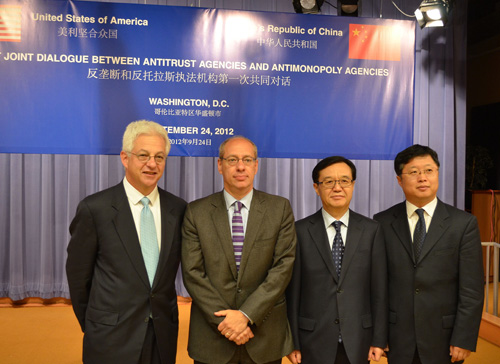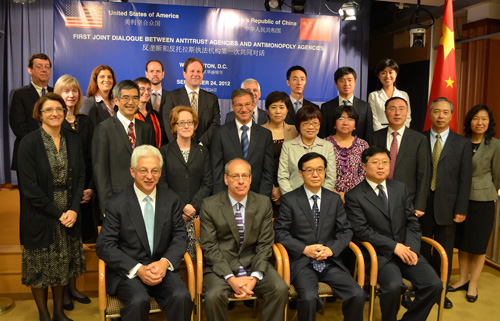Seven rent-to-own companies and a software design firm have agreed to settle Federal Trade Commission charges that they spied on consumers using computers that consumers rented from them, capturing screenshots of confidential and personal information, logging their computer keystrokes, and in some cases taking webcam pictures of people in their homes, all without notice to, or consent from, the consumers.
The software design firm collected the data that enabled rent-to-own stores to track the location of rented computers without consumers’ knowledge according to the FTC complaint. The settlements bar the companies from any further illegal spying, from activating location-tracking software without the consent of computer renters and notice to computer users, and from deceptively collecting and disclosing information about consumers.
“An agreement to rent a computer doesn’t give a company license to access consumers’ private emails, bank account information, and medical records, or, even worse, webcam photos of people in the privacy of their own homes,” said Jon Leibowitz, Chairman of the FTC. “The FTC orders today will put an end to their cyber spying.”
“There is no justification for spying on customers. These tactics are offensive invasions of personal privacy,” said Illinois Attorney General Lisa Madigan.
The FTC named DesignerWare, LLC, a company that licensed software to rent-to-own stores to help them track and recover rented computers. The FTC also reached settlements with seven companies that operate rent-to-own stores and licensed software from DesignerWare, including franchisees of Aaron’s, ColorTyme, and Premier Rental Purchase.
According to the FTC, DesignerWare’s software contained a “kill switch” the rent-to-own stores could use to disable a computer if it was stolen, or if the renter failed to make timely payments. DesignerWare also had an add-on program known as “Detective Mode” that purportedly helped rent-to-own stores locate rented computers and collect late payments. DesignerWare’s software also collected data that allowed the rent-to-own operators to secretly track the location of rented computers, and thus the computers’ users.
When Detective Mode was activated, the software could log key strokes, capture screen shots and take photographs using a computer’s webcam, the FTC alleged. It also presented a fake software program registration screen that tricked consumers into providing their personal contact information.
Data gathered by DesignerWare and provided to rent-to-own stores using Detective Mode revealed private and confidential details about computer users, such as user names and passwords for email accounts, social media websites, and financial institutions; Social Security numbers; medical records; private emails to doctors; bank and credit card statements; and webcam pictures of children, partially undressed individuals, and intimate activities at home, according to the FTC.
In its complaint against DesignerWare, the FTC charged that licensing and enabling Detective Mode, gathering personal information about renters, and disclosing that information to the rent-to-own businesses was unfair, and violated the FTC Act. The agency also alleged that DesignerWare’s use of geolocation tracking software without first obtaining permission from the computers’ renters and notifying the computers’ users was unfair and illegal. It charged that providing the rent-to-own operators the means to break the law was unfair, and providing the fake registration forms to obtain consumer data was deceptive.
The seven rent-to-own companies were charged with breaking the law by secretly collecting consumers’ confidential and personal information and using it to try to collect money from them. Use of the bogus “registration” information was deceptive, the FTC alleged.
The proposed settlement orders will ban the software company and the rent-to-own stores from using monitoring software like Detective Mode and will ban them from using deception to gather any information from consumers. They also will prohibit the use of geolocation tracking without consumer consent and notice, and bar the use of fake software registration screens to collect personal information from consumers. In addition, DesignerWare will be barred from providing others with the means to commit illegal acts, and the seven rent-to-own stores will be prohibited from using information improperly gathered from consumers in connection with debt collection. All the proposed settlements contain record keeping requirements to allow the FTC to monitor compliance with the orders for the next 20 years.
Those named in the FTC’s complaints include DesignerWare, LLC; its principals, Timothy Kelly and Ronald P. Koller, individually and as officers of DesignerWare, LLC.; Aspen Way Enterprises, Inc.; Watershed Development Corp.; Showplace, Inc., d/b/a Showplace Rent-to-Own; J.A.G. Rents, LLC, d/b/a ColorTyme; Red Zone, Inc., d/b/a ColorTyme; B. Stamper Enterprises, Inc., d/b/a Premier Rental Purchase; and C.A.L.M. Ventures, Inc., d/b/a Premier Rental Purchase.
The Office of the Illinois Attorney General partnered with the FTC in this investigation. Today General Lisa Madigan announced the filing of an action against one of the rent-to-own companies that used Detective Mode and that is located in Illinois, Watershed Development Corp.
The Commission vote to accept the consent agreement packages containing the proposed consent orders for public comment was 4-0-1, with Commissioner J. Thomas Rosch abstaining. The FTC will publish a description of the consent agreement package in the Federal Register shortly. The agreement will be subject to public comment for 30 days, beginning today and continuing through October 25, 2012, after which the Commission will decide whether to make the proposed consent order final.
Comments can be submitted electronically or in paper form. Submit comments online via the following links:
- DesignerWare, LLC
- Timothy Kelly and Ronald P. Koller
- Aspen Way Enterprises, Inc.
- B. Stamper Enterprises, Inc.
- C.A.L.M. Ventures, Inc.
- J.A.G. Rents, LLC
- Red Zone Investment Group, Inc
- Showplace, Inc.
- Watershed Development Corp.
Comments in paper form should be mailed or delivered to: Federal Trade Commission, Office of the Secretary, Room H-113 (Annex D), 600 Pennsylvania Avenue, N.W., Washington, D.C. 20580. The FTC is requesting that any comment filed in paper form near the end of the public comment period be sent by courier or overnight service, if possible, because U.S. postal mail in the Washington area and at the Commission is subject to delay due to heightened security precautions.
NOTE: The Commission issues an administrative complaint when it has “reason to believe” that the law has been or is being violated, and it appears to the Commission that a proceeding is in the public interest. The complaint is not a finding or ruling that the respondent has actually violated the law. A consent agreement is for settlement purposes only and does not constitute an admission by the respondent that the law has been violated. When the Commission issues a consent order on a final basis, it carries the force of law with respect to future actions. Each violation of such an order may result in a civil penalty of up to $16,000.
The Federal Trade Commission works for consumers to prevent fraudulent, deceptive, and unfair business practices and to provide information to help spot, stop, and avoid them. To file a complaint in English or Spanish, visit the FTC’s online Complaint Assistant or call 1-877-FTC-HELP (1-877-382-4357). The FTC enters complaints into Consumer Sentinel, a secure, online database available to more than 2,000 civil and criminal law enforcement agencies in the U.S. and abroad. The FTC’s website provides free information on a variety of consumer topics. Like the FTC on Facebook, follow us on Twitter, and subscribe to press releases for the latest FTC news and resources.


